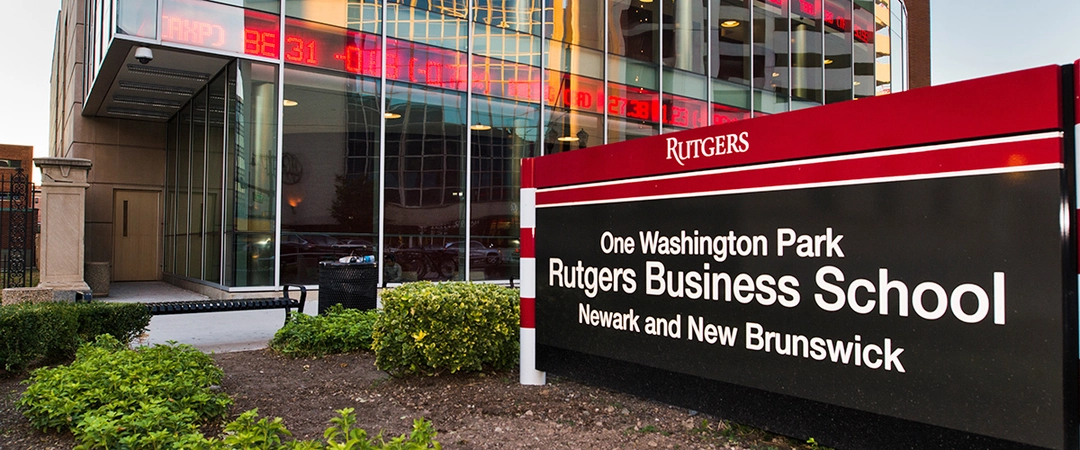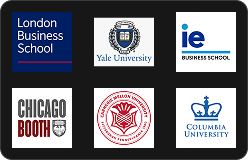
Top MEM Schools in USA: Why Everyone’s Talking About This Degree
What Is a MEM Degree and Why Is It So Popular?If you're a STEM graduate who wants to lead teams, manage projects, and s…
Table of Contents

Key Highlights of the Rutgers Business School MFin Program
Before we dive into the full blog, here are the most important things to know about the Rutgers Master of Finance (MFin) program:
This program is perfect for recent graduates or people with little work experience who want to grow fast in finance.
The Rutgers Master of Finance (MFin) program is a full-time course that helps students build strong skills in finance, numbers, and technology. It takes place at Rutgers Business School, which has campuses in Newark and New Brunswick, New Jersey.
This program is STEM-designated, which means if you're an international student, you can work in the U.S. for up to 3 years after you graduate.
You can finish the degree in 12 to 18 months, depending on your schedule. The classes are designed to prepare you for jobs in investment banking, fintech, risk management, and more.
Students choose the Rutgers MFin program for many good reasons:
This program is STEM-designated, which means international students can stay and work in the U.S. for up to 36 months after they graduate. That’s great for getting real job experience!
Rutgers Business School is in Newark, New Jersey. That’s just a short train ride to New York City, where many of the world’s biggest finance companies are. You can go to job fairs, networking events, and even get internships nearby.
You get to pick your own classes depending on what kind of job you want. The school offers finance electives Rutgers students love—like classes in:
This helps you focus on the area you enjoy most.
More than 85% of students get jobs within 6 months of graduation. Most earn $80,000 to $95,000 a year.
Rutger has a large number of graduates working in finance. These alumni can help you with job tips, referrals, and mentorship.
Students get access to cool tools like Bloomberg terminals, Python, and other data programs. These are also used in Rutgers financial engineering and make you job-ready in today's tech-driven world.
Rutgers Business School is known across the U.S. for having one of the top finance programs. It's especially strong in:
Students often compare Rutgers with other famous schools. Some people search for “duke u rank” or visit sites like “essec mim reddit” to check what real students say about programs. But Rutgers holds its own with great rankings!
Here’s how Rutgers ranks for finance:
| Ranking Group | Rutgers' Rank |
|---|---|
| U.S. News & World Report (Best Finance Programs) | Top 40 |
| QS World University Rankings (Finance) | Top 50 |
| Financial Times (U.S. Finance Programs) | Top 25 |
These rankings show that Rutger is respected for helping students succeed in top financial jobs.

Each year, about 60 to 80 students join the Rutgers MFin program. These students come from many different study backgrounds, like:
This mix makes class discussions fun and full of new ideas.
To get into Rutgers MFin, you should show strong skills in math and numbers. Here’s what most admitted students look like:
| Admission Item | Average Score |
|---|---|
| GMAT | 650 – 710 |
| GRE Quant Section | 160+ |
| GPA (College Grade) | 3.4+ |
| Work Experience | 0 – 3 years |
You don’t need work experience, but having an internship or a finance-related job helps your chances.
About 40 to 50% of the students are from countries outside the U.S. Many international students choose this program because it’s STEM-designated, which allows them to work in the U.S. for up to 3 years after graduation.
The Rutgers MFin program is competitive, but not impossible to get into. The acceptance rate is about 30% to 40%, which means they choose the best students from all the applications.
To get accepted, the admissions team looks at:
Rutgers uses a rolling admissions system. That means they look at applications as they come in. If you apply early, you have a better chance to get accepted and maybe win a scholarship.
Here are the deadlines:
| Round | Deadline | Best For |
|---|---|---|
| 1 | Early October | All students, scholarship seekers |
| 2 | Mid-December | International students (for visa) |
| 3 | Early March | U.S. and international applicants |
| 4 | Late May | Final chance to apply |
If you're an international student, it's best to apply by Round 2 or 3 to have enough time for visa paperwork.
The Rutgers MFin program teaches you all the finance skills you'll need for top jobs. It mixes classroom learning with hands-on practice, so you’re ready for the real world.
These are the main classes that everyone has to take:
These courses help you understand how money works, how to make smart investment choices, and how to use data in finance.
After the main classes, you can choose special tracks to match your career goals. These are the most popular ones:
There are lots of finance electives Rutgers offers that let you choose what interests you the most.
The Rutgers MFin program doesn’t just give you classroom lessons — it also gives you real-world experience. You'll get to practice finance, join clubs, and work on projects that prepare you for real jobs.
Here are some ways you’ll get practical experience:
Rutgers has fun and useful clubs for finance students. These clubs let you meet friends, learn from pros, and even find job leads.
Here are a few clubs you can join:
These clubs are a great way to grow your network and gain extra experience outside the classroom.
The total cost of the Rutgers MFin program includes tuition, fees, books, and living expenses. Since the program is in Newark and New Brunswick, New Jersey, the cost of living is lower than in places like New York City, but you still need to plan your budget.
Here’s a breakdown of the estimated cost:
| Expense | In-State Students | Out-of-State & International Students |
|---|---|---|
| Tuition | $39,000 | $48,000 |
| Fees | $1,500 | $1,500 |
| Books & Supplies | $1,200 | $1,200 |
| Living Expenses (housing, food, etc.) | $18,000 | $18,000 |
| Health Insurance | $3,000 | $3,000 |
| Total Estimated Cost | $62,700 | $71,700 |
If you're researching online, you may see people asking, “What is the tuition for Rutgers?” or “How much is Rutgers 2025 tuition?” These numbers above give you a good estimate, but always check the official site for updates.
For students who live in New Jersey, the Rutgers Newark in-state tuition is lower than for out-of-state students. If you’re comparing campus costs, also look up Rutgers New Brunswick tuition to decide which location works best for your budget.
Rutgers offers several options to help you manage the cost:
Applying early gives you a better chance of getting scholarships or assistantships. Many students find ways to lower their MFin tuition by planning ahead.

Graduates of the Rutgers MFin program do well in the job market. They get jobs in top industries like investment banking, corporate finance, fintech, consulting, and asset management.
Here are the job numbers:
| Employment Metric | Statistic |
|---|---|
| Employment Rate (within 6 months) | 85% or higher |
| Average Base Salary | $80,000 – $95,000 |
| Median Signing Bonus | $5,000 – $12,000 |
| Top Hiring Industries | Investment Banking, Corporate Finance, Fintech, Asset Management, Consulting |
Most students get full-time jobs soon after graduation, and many even get offers before finishing the program.
Many top companies hire Rutgers graduates, including banks, Fortune 500 companies, and fast-growing startups.
Some top recruiters are:
Students are hired for roles like:
The Rutgers Career Management Office helps students with career coaching, resume building, and connecting with companies through job fairs and networking events.
Students who finish the Rutgers MFin program find jobs in many areas of the finance world. Because the program focuses on both math and real-world skills, graduates are ready to work in fast-growing industries.
Here are some of the most common sectors and job titles:
| Sector | Common Job Roles |
|---|---|
| Investment Banking | M&A Analyst, Investment Banking Analyst, Equity Research Associate |
| Corporate Finance | Financial Analyst, Treasury Analyst, FP&A Associate |
| Asset & Wealth Management | Portfolio Analyst, Hedge Fund Analyst, Wealth Management Associate |
| Fintech & Data Analytics | Financial Data Analyst, Risk Modeling Analyst, Blockchain Analyst |
| Consulting | Risk Advisory Analyst, Financial Consultant, Strategy Analyst |
These jobs let students work with money, solve business problems, or help big companies make better financial decisions. The strong training from Rutgers helps students feel confident in interviews and on the job.
The Rutgers Business School alumni network plays a key role in helping students build connections, secure job placements, and advance their careers. With over 40,000+ finance alumni worldwide, Rutgers has a strong presence in global finance markets.
The Rutgers MFin alumni network is an invaluable resource for students looking to establish strong industry connections and accelerate their careers.
Admission to the Rutgers Business School MFin program is competitive and requires applicants to submit essays, recommendation letters, and attend an interview. The selection process evaluates candidates based on academic performance, leadership skills, and career potential.
Applicants must submit one or more essays to demonstrate their motivation and suitability for the Rutgers MFin program. Common essay prompts include:
Essay Writing Tips:
Applicants are required to submit at least one letter of recommendation, preferably from:
A strong letter of recommendation should emphasize:
Shortlisted candidates are invited for an admissions interview, which focuses on:
Interview Preparation Tips:

There are many Master of Finance programs out there, but the Rutgers MFin program stands out for a few big reasons. It gives you great learning, real job chances, and a location that puts you right near some of the biggest finance companies in the world.
One of the most important benefits of the Rutgers MFin program is that it’s STEM-designated. This matters a lot for international students.
Here’s why:
Also, companies like hiring STEM graduates because they usually have strong math, coding, and data skills—things that are very important in finance today.
Rutgers Business School is located in Newark, New Jersey—just a quick train ride away from New York City. This is a big deal if you want to work in finance, because NYC is home to:
Being so close means you can attend:
You’ll meet real professionals, ask questions, and maybe even land a job or internship.
Many of the professors at Rutgers have worked in:
This means they don’t just teach from books—they also share real-life stories, trends, and tools from their own careers.
Students also get to:
If you’re someone who wants more than just theory and books, Rutgers gives you a mix of classroom learning and practical experience—a big reason why it’s different from other programs.
For prospective applicants, the following resources provide additional insights and support:
For the latest updates on curriculum, admissions, and career opportunities, visit the official program page.
The Rutgers Business School MFin program is an excellent choice for students looking to build a strong foundation in finance and analytics. With a STEM designation, strong job placement, and connections to top financial firms, the Rutgers MFin program provides high ROI and excellent career opportunities.
